'I'VE NEVER BEEN LEGITIMATE, I'VE GOT PRINCIPLES!'
Unrepentant old school NJ Jewish mobster sings like a canary in Amazon documentary
At 84, second-generation gangster Myron Sugerman was king of illegal slots and helped fund Nazi hunter Simon Wiesenthal. Now he tells all in the 2022 film ‘Last Man Standing’
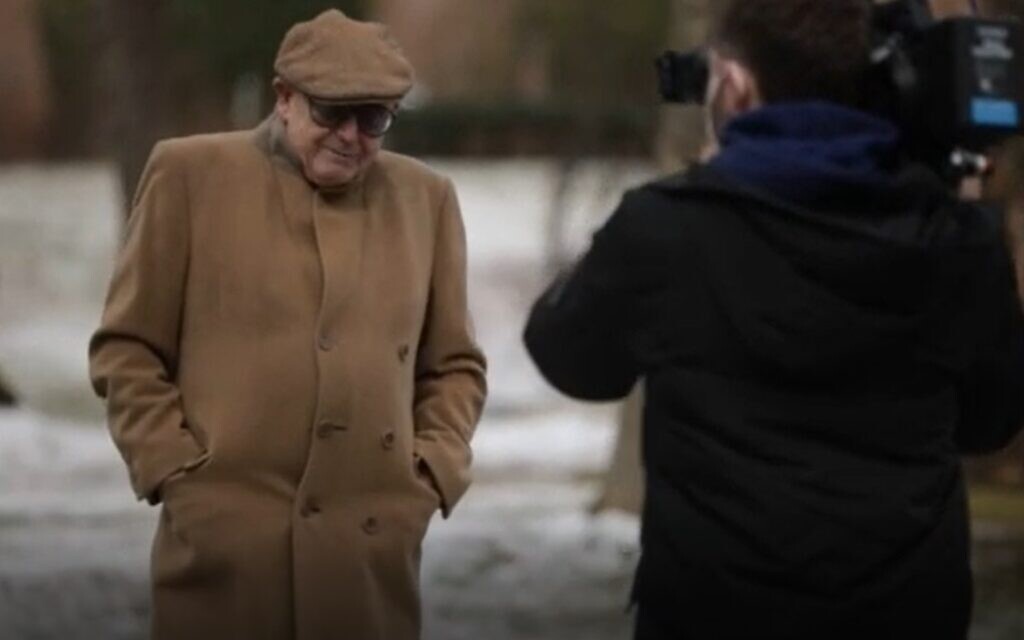
Myron Sugerman during the filming of 'Last Man Standing.' (Courtesy)
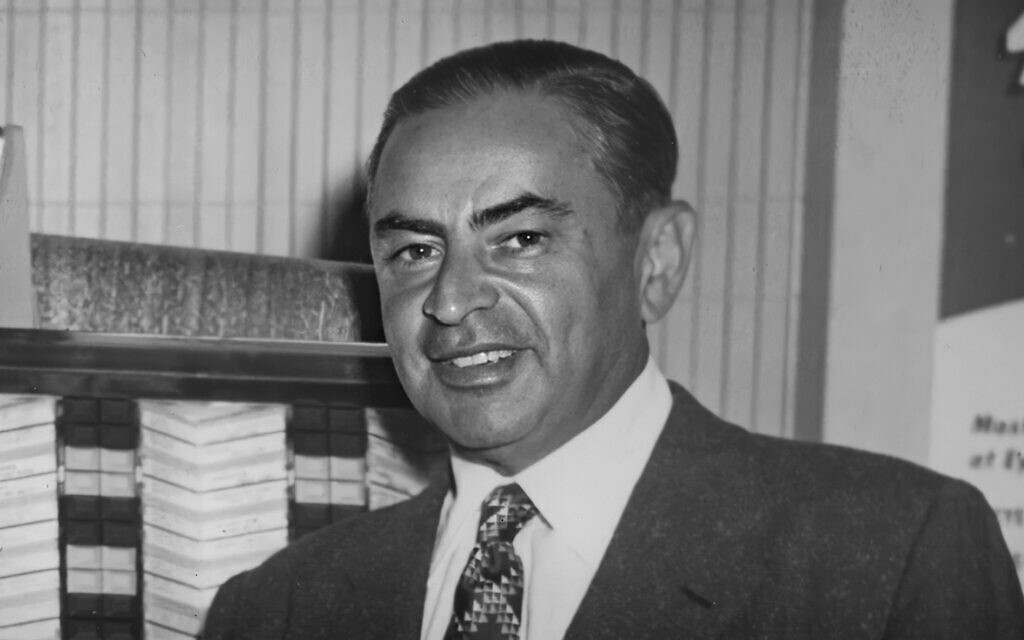
Jewish mobster Barney Sugerman in an undated photo. (Courtesy)
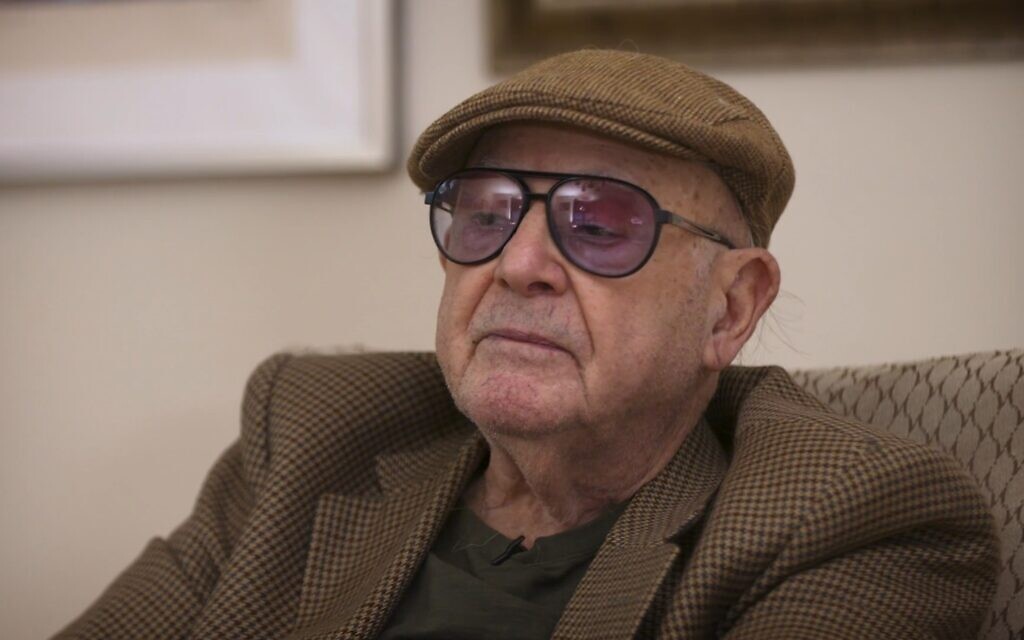
Myron Sugerman in a still from 'Last Man Standing.'(Courtesy)
At almost 85, Myron Sugerman says he is the last “real” Jewish gangster: a one-of-a-kind outlaw, a self-made “king” of illegal slot machines, and a globetrotting adventurer whose clandestine missions included strategic and financial support for Nazi hunter Simon Wiesenthal.
Still with his trademark aviators, he’s now the subject of the new Amazon Prime documentary “Last Man Standing: The Chronicles of Myron Sugerman.” The film tracks the life of Sugerman, who was born in 1938 in Newark, New Jersey, and almost immediately catapulted into a life of crime by his father Barney Sugerman, otherwise known as “Sugie” — a prominent gangster in the Roaring Twenties.
Sugie was a member of the New Jersey Jewish Mob along with such other infamous characters as Meyer Lansky, Bugsy Seigel, Charlie “Lucky” Luciano, Joe “Doc” Stacher, Abe Green and Abner “Longie” Zwillman, who was known as the Al Capone of New Jersey.
The younger Sugerman’s friends and associates were also all outlaws. “If somebody was ever to say to me, ‘Did you know anyone that was illegal?’ I never knew anybody that was legitimate,” Sugarman candidly says in the film. But, he adds, they were all solid guys who stood up to the violent antisemitism that was prevalent at the time.
Indeed, Sugerman’s first years coincided with the dramatic rise of the American Nazi movement, right on his doorstep. The German American Bund party was led by Fritz Kuhn, who proudly declared himself the “Hitler of the United States.” The group would meet in the local beer gardens and then, intoxicated, they would go into the old neighborhoods and beat up Jews.
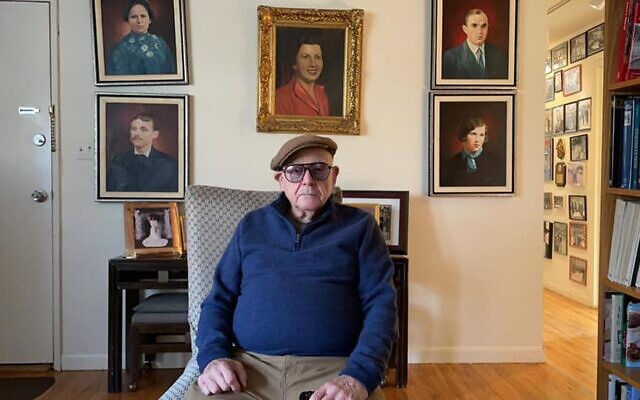
Myron Sugerman poses in his Newark, New Jersey, home in this still from ‘Last Man Standing.’ (Courtesy)
The second-generation gangster recounts vividly how his father and other members of the Jewish mob responded to the surge in violence.
“There was always this question of Jewish pride,” Sugarman says in the film. “The Jewish gangster really had a psychological need to show that the Jews could be just as tough as any other ethnicity because they were going to break with the 2,000 years of our heads-down living in the ghetto, fearful. There was definitely no identity crisis.
Stints in the joint
There were times in Sugerman’s life when he knew his “destiny did not have a good future,” but he was too inextricably involved to pick himself up and run. In the 1980s he was charged with copyright infringement for selling knock-off Pac-Man boards, which saw him locked up until he reached a plea bargain. Then, in 1993 the US government launched a federal investigation that resulted in his being imprisoned for 19 months
Sugerman has few regrets about his unlawfulness, commenting wryly that “I never did anything legitimate — I had principles.”
He was just responding to public demand, he says, noting that the goods and services he supplied were soon legalized by the government anyway.
“When they see something is profitable, they take it away from the mobsters and take it away for themselves… The big fish eat the little fish, and that is the way of the world,” Sugerman says.
Being locked up did not dampen his enthusiasm — on the contrary, he used the downtime to work on personal development.
“I got in good shape, read a book a night and became very knowledgeable,” he says. “If you approach life from a positive it is tremendous.”
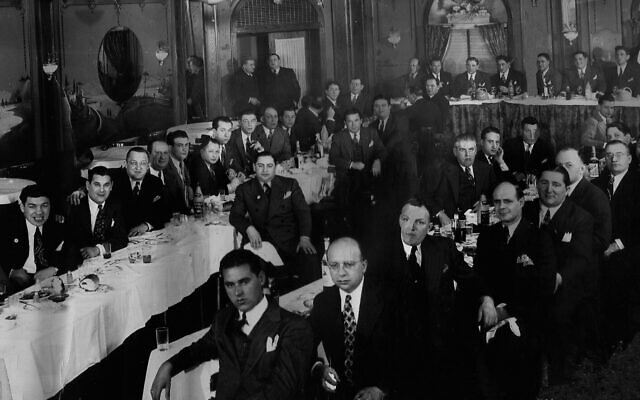
An undated photo of a gala dinner for Jewish mobsters in Newark, New Jersey. (Courtesy)
His son, the rabbi
Over the years, Sugerman has become increasingly committed to his Judaism, observing that “you cannot have Jews without Judaism.” A proud Zionist, Sugerman has three sons, one of whom is a Modern Orthodox rabbi with eight children, living in Boca Raton, Florida.
“He could have been a gangster, but instead he is a rabbi,” Sugerman jokes. “I am not going to be perfect, my son will be.”
He could have been a gangster, but instead he is a rabbi
The film ends with Sugerman visiting the graves of Jewish mafia men Zwillman and Green. In the emotional scene, he contemplates sadly how decades after the deaths of these proud defenders of Judaism the resurgence of antisemitism is greater today than it was before the 1930s.
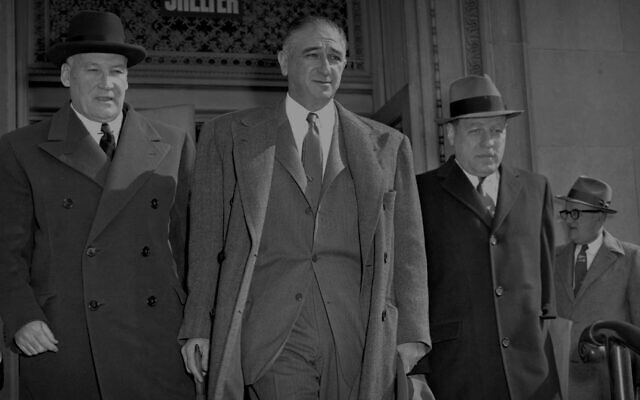
Jewish mobster Abner ‘Longie’ Zwillman in an undated photo. (Courtesy)
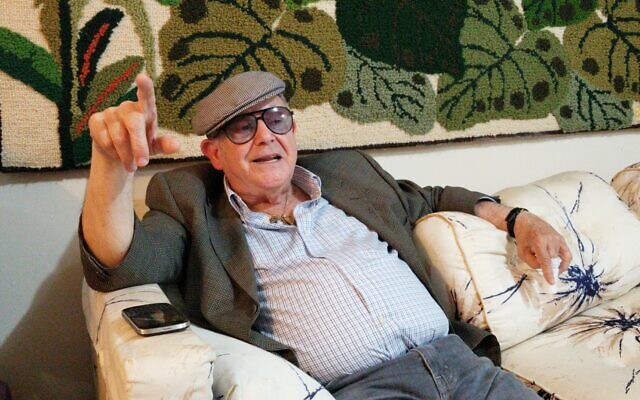
Myron Sugerman reminisces in his Newark, New Jersey, home in this still from ‘Last Man Standing.’ (Courtesy)
Caplan is especially grateful for the success of the movie given the challenges encountered in its making. It nearly didn’t see the light of day, as production coincided with the height of the coronavirus pandemic when travel was restricted and infections sky-high.
Sugerman himself was hit with COVID, pneumonia and vertigo but fought through them, leaving Caplan doubly impressed by his relentless determination.
“He is the original life-sized iconic gangster — the accent, the hat and glasses, his manner, it’s all just so priceless. What I most appreciated is his strong character and energy, which resonates when you meet him,” says Caplan. “I fell in love with Myron the first time we talked.”
Unrepentant old school NJ Jewish mobster sings like a canary in Amazon documentary
At 84, second-generation gangster Myron Sugerman was king of illegal slots and helped fund Nazi hunter Simon Wiesenthal. Now he tells all in the 2022 film ‘Last Man Standing’

Myron Sugerman during the filming of 'Last Man Standing.' (Courtesy)

Jewish mobster Barney Sugerman in an undated photo. (Courtesy)

Myron Sugerman in a still from 'Last Man Standing.'(Courtesy)
At almost 85, Myron Sugerman says he is the last “real” Jewish gangster: a one-of-a-kind outlaw, a self-made “king” of illegal slot machines, and a globetrotting adventurer whose clandestine missions included strategic and financial support for Nazi hunter Simon Wiesenthal.
Still with his trademark aviators, he’s now the subject of the new Amazon Prime documentary “Last Man Standing: The Chronicles of Myron Sugerman.” The film tracks the life of Sugerman, who was born in 1938 in Newark, New Jersey, and almost immediately catapulted into a life of crime by his father Barney Sugerman, otherwise known as “Sugie” — a prominent gangster in the Roaring Twenties.
Sugie was a member of the New Jersey Jewish Mob along with such other infamous characters as Meyer Lansky, Bugsy Seigel, Charlie “Lucky” Luciano, Joe “Doc” Stacher, Abe Green and Abner “Longie” Zwillman, who was known as the Al Capone of New Jersey.
The younger Sugerman’s friends and associates were also all outlaws. “If somebody was ever to say to me, ‘Did you know anyone that was illegal?’ I never knew anybody that was legitimate,” Sugarman candidly says in the film. But, he adds, they were all solid guys who stood up to the violent antisemitism that was prevalent at the time.
Indeed, Sugerman’s first years coincided with the dramatic rise of the American Nazi movement, right on his doorstep. The German American Bund party was led by Fritz Kuhn, who proudly declared himself the “Hitler of the United States.” The group would meet in the local beer gardens and then, intoxicated, they would go into the old neighborhoods and beat up Jews.
Powerful archival footage of the infamous February 1939 Madison Square Garden Nazi rally in support of Nazism and fascism terrifyingly sets the scene of how European Jew-hatred was exported into the US.

Myron Sugerman poses in his Newark, New Jersey, home in this still from ‘Last Man Standing.’ (Courtesy)
The second-generation gangster recounts vividly how his father and other members of the Jewish mob responded to the surge in violence.
“There was always this question of Jewish pride,” Sugarman says in the film. “The Jewish gangster really had a psychological need to show that the Jews could be just as tough as any other ethnicity because they were going to break with the 2,000 years of our heads-down living in the ghetto, fearful. There was definitely no identity crisis.
These Jews were tough and were ready to prove it.”
This led to the Jewish Mob’s creation of The Newark Minute Men, based upon the “minutemen” of the American Revolution, who were ready at a minute’s notice to take on the Brown Shirts of Fritz Kuhn in Newark and the surrounding areas.
Sugerman recollects how Luciano, one of the prime members of the Italian Mob, had a close relationship with Lansky and offered to help thwart the attacks against the Jews. Lansky’s response was: “Charlie, thank you, I am grateful, appreciate it, this is a Jewish problem and this is going to be resolved with Jewish fists.”
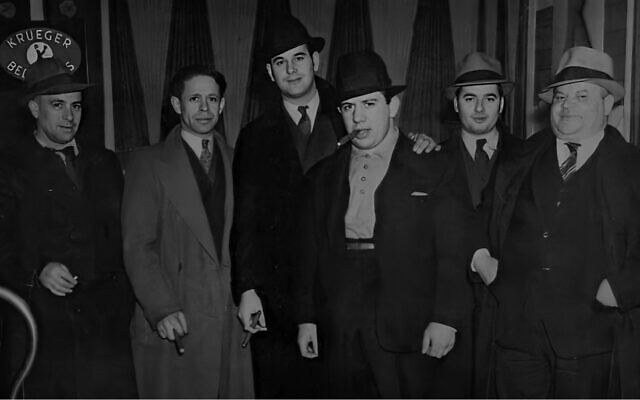
An undated photo of Barney Sugerman, center, and the Newark Minute Men. (Courtesy)
Growing up in this climate had a profound effect on Sugerman. Speaking to The Times of Israel via Zoom from his home in Montclair, New Jersey, Sugerman says that he’s always seen a chilling reminder of life’s destiny in the famous black and white photo of a young boy during the 1943 Warsaw Ghetto Uprising, his hands raised at gunpoint.
“By circumstances of birth that kid could have been born in America, and I could have been him,” Sugarman says.
This image, imprinted in Sugerman’s mind, became his raison d’etre to defend the Jewish people. The message was reinforced by his father who insisted that he and his brother take boxing lessons from a Jewish former professional, as was common at the time: “You are going to learn to defend yourself… you have that quiet weapon that nobody knows about.”
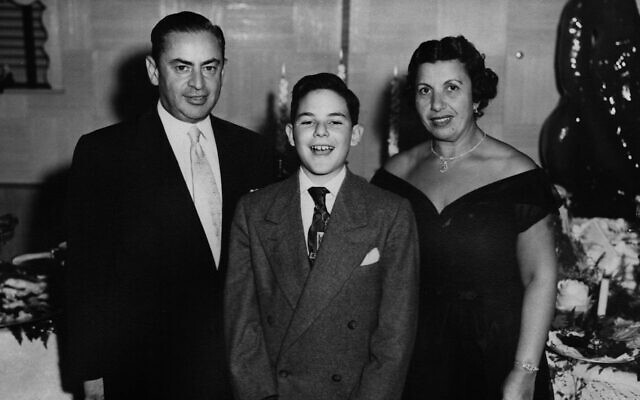
Myron Sugerman, center, with his parents at his bar mitzvah celebration. (Courtesy)
Fundraising for Wiesenthal
Jukeboxes, pinball, slot machines and other coin-operated amusements became his other calling when, fresh out of university, Sugerman joined forces with his father, Sugie. Not a violent gangster per se but rather an opportunist within a gang, Sugie started out in 1920 when the Prohibition Act took effect. He became known for bootlegging, racketeering, and the distribution of coin-operated machines within the US. His son, young, energetic and street-smart, traveled extensively across continents to become the largest supplier of illegal slot machines in the world.
The semi-retired outlaw chronicles his life frankly and with plenty of humor, even when describing the tough times. “What kind of life is it as an outlaw living outside the law?” he asks in the film. “It is extremely stressful. You don’t know where your enemy is going to come from — either from above, the law, or whether it’s going to be coming from other members of the organized crime-disorganized crime world. So you got to be on your toes at all times.”
The lure of financial success, however, did not deter the gangster from his other mission inspired by his father “to do more than just make money in life.” After the public trial of Adolf Eichmann in Israel in 1961, Sugerman felt impelled to take action.
On a business trip to Austria in 1965, the 27-year-old showed up at the office of famed Nazi hunter Simon Wiesenthal. Their meeting, which took place against the backdrop of a world map highlighted with concentration camp locations, was the beginning of a firm friendship. He volunteered to help Wiesenthal raise funds for information, in particular in the hunt for the Angel of Death, Josef Mengele, who was living in Paraguay.
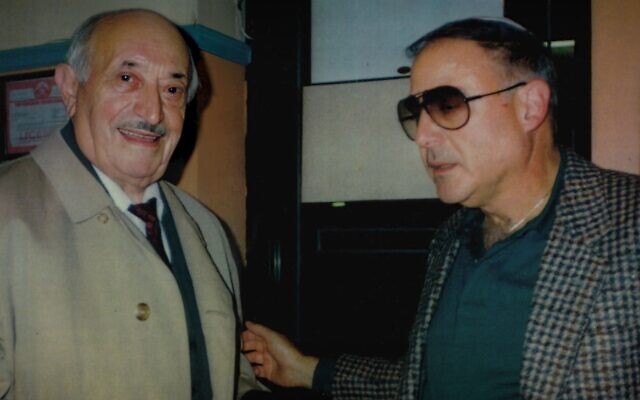
Myron Sugerman, right, speaks with Nazi hunter Simon Wiesenthal in Wiesenthal’s New York City office. (Courtesy)
Sugerman’s Hebrew name is Meyer and he authored “The Chronicles of the Last Jewish Gangster: From Meyer to Myron.” He finally got to meet his namesake Lansky on a trip to Israel in 1970. The infamous Jewish mobster gave him one piece of crucial advice: “Son, when you see your name start to appear in the front pages of newspapers, pick your tuchus up and run.”
This led to the Jewish Mob’s creation of The Newark Minute Men, based upon the “minutemen” of the American Revolution, who were ready at a minute’s notice to take on the Brown Shirts of Fritz Kuhn in Newark and the surrounding areas.
Sugerman recollects how Luciano, one of the prime members of the Italian Mob, had a close relationship with Lansky and offered to help thwart the attacks against the Jews. Lansky’s response was: “Charlie, thank you, I am grateful, appreciate it, this is a Jewish problem and this is going to be resolved with Jewish fists.”

An undated photo of Barney Sugerman, center, and the Newark Minute Men. (Courtesy)
Growing up in this climate had a profound effect on Sugerman. Speaking to The Times of Israel via Zoom from his home in Montclair, New Jersey, Sugerman says that he’s always seen a chilling reminder of life’s destiny in the famous black and white photo of a young boy during the 1943 Warsaw Ghetto Uprising, his hands raised at gunpoint.
“By circumstances of birth that kid could have been born in America, and I could have been him,” Sugarman says.
This image, imprinted in Sugerman’s mind, became his raison d’etre to defend the Jewish people. The message was reinforced by his father who insisted that he and his brother take boxing lessons from a Jewish former professional, as was common at the time: “You are going to learn to defend yourself… you have that quiet weapon that nobody knows about.”

Myron Sugerman, center, with his parents at his bar mitzvah celebration. (Courtesy)
Fundraising for Wiesenthal
Jukeboxes, pinball, slot machines and other coin-operated amusements became his other calling when, fresh out of university, Sugerman joined forces with his father, Sugie. Not a violent gangster per se but rather an opportunist within a gang, Sugie started out in 1920 when the Prohibition Act took effect. He became known for bootlegging, racketeering, and the distribution of coin-operated machines within the US. His son, young, energetic and street-smart, traveled extensively across continents to become the largest supplier of illegal slot machines in the world.
The semi-retired outlaw chronicles his life frankly and with plenty of humor, even when describing the tough times. “What kind of life is it as an outlaw living outside the law?” he asks in the film. “It is extremely stressful. You don’t know where your enemy is going to come from — either from above, the law, or whether it’s going to be coming from other members of the organized crime-disorganized crime world. So you got to be on your toes at all times.”
The lure of financial success, however, did not deter the gangster from his other mission inspired by his father “to do more than just make money in life.” After the public trial of Adolf Eichmann in Israel in 1961, Sugerman felt impelled to take action.
On a business trip to Austria in 1965, the 27-year-old showed up at the office of famed Nazi hunter Simon Wiesenthal. Their meeting, which took place against the backdrop of a world map highlighted with concentration camp locations, was the beginning of a firm friendship. He volunteered to help Wiesenthal raise funds for information, in particular in the hunt for the Angel of Death, Josef Mengele, who was living in Paraguay.

Myron Sugerman, right, speaks with Nazi hunter Simon Wiesenthal in Wiesenthal’s New York City office. (Courtesy)
Sugerman’s Hebrew name is Meyer and he authored “The Chronicles of the Last Jewish Gangster: From Meyer to Myron.” He finally got to meet his namesake Lansky on a trip to Israel in 1970. The infamous Jewish mobster gave him one piece of crucial advice: “Son, when you see your name start to appear in the front pages of newspapers, pick your tuchus up and run.”
Stints in the joint
There were times in Sugerman’s life when he knew his “destiny did not have a good future,” but he was too inextricably involved to pick himself up and run. In the 1980s he was charged with copyright infringement for selling knock-off Pac-Man boards, which saw him locked up until he reached a plea bargain. Then, in 1993 the US government launched a federal investigation that resulted in his being imprisoned for 19 months
Sugerman has few regrets about his unlawfulness, commenting wryly that “I never did anything legitimate — I had principles.”
He was just responding to public demand, he says, noting that the goods and services he supplied were soon legalized by the government anyway.
“When they see something is profitable, they take it away from the mobsters and take it away for themselves… The big fish eat the little fish, and that is the way of the world,” Sugerman says.
Being locked up did not dampen his enthusiasm — on the contrary, he used the downtime to work on personal development.
“I got in good shape, read a book a night and became very knowledgeable,” he says. “If you approach life from a positive it is tremendous.”

An undated photo of a gala dinner for Jewish mobsters in Newark, New Jersey. (Courtesy)
His son, the rabbi
Over the years, Sugerman has become increasingly committed to his Judaism, observing that “you cannot have Jews without Judaism.” A proud Zionist, Sugerman has three sons, one of whom is a Modern Orthodox rabbi with eight children, living in Boca Raton, Florida.
“He could have been a gangster, but instead he is a rabbi,” Sugerman jokes. “I am not going to be perfect, my son will be.”
He could have been a gangster, but instead he is a rabbi
The film ends with Sugerman visiting the graves of Jewish mafia men Zwillman and Green. In the emotional scene, he contemplates sadly how decades after the deaths of these proud defenders of Judaism the resurgence of antisemitism is greater today than it was before the 1930s.

Jewish mobster Abner ‘Longie’ Zwillman in an undated photo. (Courtesy)
All too resonant today
Director Jonny Caplan was drawn to Sugerman’s story as it showcased one man’s fight against antisemitism in a time when Jew-hatred has become very prevalent.
Using art deco and archival footage from the Roaring Twenties to the present day, the film brings viewers back into the Prohibition era, and its catchy klezmer-like soundtrack provides an apt background for Sugerman’s voiceovers.
“I was sold the moment I learned of Myron and the Sugermans’ contribution to fight antisemitism in the Western world, and his personal journey until this very day to connect, unite and educate others,” Caplan says.
The true crime feature documentary is initially viewable on Amazon Prime and will roll out to more networks and streamers in 2023. Caplan’s company Impossible Media has also purchased the rights to Sugerman’s story and is developing a dramatized television series based on his life.
Director Jonny Caplan was drawn to Sugerman’s story as it showcased one man’s fight against antisemitism in a time when Jew-hatred has become very prevalent.
Using art deco and archival footage from the Roaring Twenties to the present day, the film brings viewers back into the Prohibition era, and its catchy klezmer-like soundtrack provides an apt background for Sugerman’s voiceovers.
“I was sold the moment I learned of Myron and the Sugermans’ contribution to fight antisemitism in the Western world, and his personal journey until this very day to connect, unite and educate others,” Caplan says.
The true crime feature documentary is initially viewable on Amazon Prime and will roll out to more networks and streamers in 2023. Caplan’s company Impossible Media has also purchased the rights to Sugerman’s story and is developing a dramatized television series based on his life.

Myron Sugerman reminisces in his Newark, New Jersey, home in this still from ‘Last Man Standing.’ (Courtesy)
Caplan is especially grateful for the success of the movie given the challenges encountered in its making. It nearly didn’t see the light of day, as production coincided with the height of the coronavirus pandemic when travel was restricted and infections sky-high.
Sugerman himself was hit with COVID, pneumonia and vertigo but fought through them, leaving Caplan doubly impressed by his relentless determination.
“He is the original life-sized iconic gangster — the accent, the hat and glasses, his manner, it’s all just so priceless. What I most appreciated is his strong character and energy, which resonates when you meet him,” says Caplan. “I fell in love with Myron the first time we talked.”
No comments:
Post a Comment